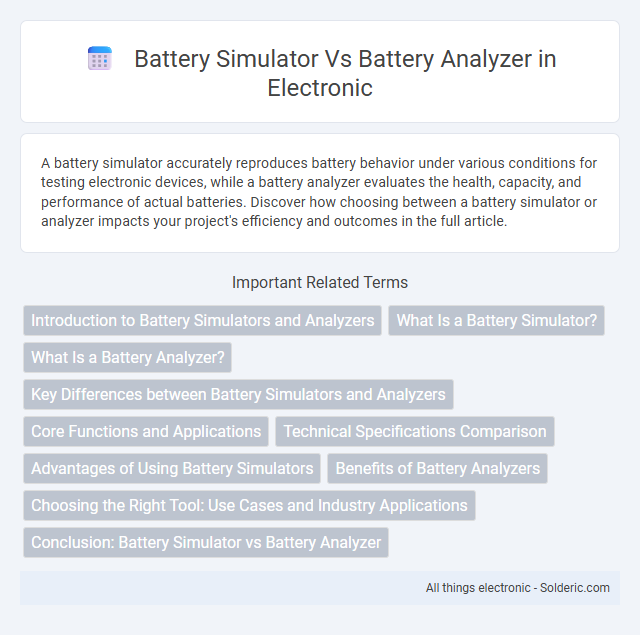A battery simulator accurately reproduces battery behavior under various conditions for testing electronic devices, while a battery analyzer evaluates the health, capacity, and performance of actual batteries. Discover how choosing between a battery simulator or analyzer impacts your project's efficiency and outcomes in the full article.
Comparison Table
| Feature | Battery Simulator | Battery Analyzer |
|---|---|---|
| Primary Function | Simulates battery behavior and characteristics for testing purposes | Measures and analyzes actual battery performance and health |
| Use Case | Device development, validation, and battery management system testing | Battery diagnostics, capacity testing, and quality control |
| Data Output | Simulated voltage, current, and state of charge data | Real-time voltage, current, capacity, impedance, and temperature data |
| Measurement Accuracy | Depends on simulation model accuracy | Precise and based on actual battery measurements |
| Application | Firmware testing and power system design | Battery health monitoring and lifecycle analysis |
| Example Devices | Programmable electronic loads and power supplies with battery simulation | Battery analyzers, impedance testers, and cell testers |
Introduction to Battery Simulators and Analyzers
Battery simulators replicate battery behavior by providing controlled voltage and current outputs for testing electronic devices under various conditions. Battery analyzers measure actual battery performance metrics such as capacity, internal resistance, and state of health to assess real-time battery conditions. Understanding the differences between battery simulators and analyzers helps you select the appropriate tool for development or diagnostic applications.
What Is a Battery Simulator?
A battery simulator is an electronic device designed to mimic the electrical characteristics of real batteries, providing a controlled and repeatable power source for testing purposes. It supplies adjustable voltage and current output to simulate different battery conditions, enabling precise evaluation of battery-powered systems and devices. Unlike a battery analyzer, which primarily assesses the health and performance of actual batteries, a battery simulator facilitates development and troubleshooting by emulating battery behavior without using physical cells.
What Is a Battery Analyzer?
A battery analyzer is a specialized instrument designed to assess the health, capacity, and performance of rechargeable batteries by measuring parameters such as internal resistance, voltage, and charge/discharge cycles. Unlike a battery simulator, which mimics battery behavior for testing electronic devices, a battery analyzer provides diagnostic insights to identify battery degradation and predict remaining useful life. This tool is essential for maintaining battery reliability in applications ranging from consumer electronics to electric vehicles and industrial power systems.
Key Differences between Battery Simulators and Analyzers
Battery simulators replicate battery behavior for testing power systems without using real batteries, enabling safe and controlled environment testing of voltage, current, and charge conditions. Battery analyzers measure and evaluate actual battery health, capacity, internal resistance, and performance over time to provide accurate diagnostics. Understanding your testing needs helps determine whether a battery simulator's virtual replication or a battery analyzer's direct measurement is more suitable.
Core Functions and Applications
Battery simulators replicate battery behavior by outputting controlled voltage and current to test devices under various conditions, enabling developers to evaluate power management systems and electronic components without using actual batteries. Battery analyzers measure real battery parameters such as capacity, internal resistance, and state of health to diagnose performance and lifespan in applications like electric vehicles, portable electronics, and renewable energy storage. The core function of simulators is to emulate battery characteristics for design and testing, whereas analyzers focus on real-time assessment and quality control of existing batteries.
Technical Specifications Comparison
Battery simulators offer precise voltage and current output controls, supporting dynamic load profiles up to several kilowatts to replicate real battery behavior under varying conditions. Battery analyzers focus on diagnostic capabilities, measuring internal resistance, capacity, and state-of-health with high accuracy using impedance spectroscopy and coulomb counting techniques. While simulators emphasize output stability and waveform accuracy, analyzers prioritize detailed battery performance metrics and fault detection over extended testing cycles.
Advantages of Using Battery Simulators
Battery simulators offer precise control over voltage, current, and state-of-charge, enabling reliable testing of battery management systems without the risks associated with real batteries. They provide repeatable, safe, and cost-effective simulation of various battery conditions, accelerating development cycles and reducing dependency on physical battery prototypes. This versatility enhances troubleshooting, calibration, and validation processes, leading to improved product reliability and performance.
Benefits of Battery Analyzers
Battery analyzers provide precise measurement of battery health, capacity, and lifespan, enabling accurate diagnostics and predictive maintenance. These devices ensure optimal battery performance by detecting issues such as voltage irregularities, internal resistance, and charge-discharge efficiency. Your ability to extend battery life and prevent unexpected failures increases significantly with the comprehensive data offered by battery analyzers compared to basic battery simulators.
Choosing the Right Tool: Use Cases and Industry Applications
Battery simulators are ideal for testing battery management systems and power electronics by emulating various battery conditions without physical cells, widely used in automotive and renewable energy industries. Battery analyzers measure actual battery performance, capacity, and health, essential for quality control and maintenance in manufacturing and field service applications. Selecting the right tool depends on whether virtual testing or real-time battery diagnostics are required for efficient development and reliability.
Conclusion: Battery Simulator vs Battery Analyzer
A battery simulator replicates the voltage and current characteristics of a battery to test electrical devices under controlled conditions, while a battery analyzer measures real battery performance, capacity, and health accurately. You should choose a battery simulator for development and troubleshooting of battery-powered systems, whereas a battery analyzer is essential for assessing actual battery lifespan and efficiency. Both tools serve complementary roles in ensuring optimal battery functionality and reliability.
Battery simulator vs battery analyzer Infographic

 solderic.com
solderic.com